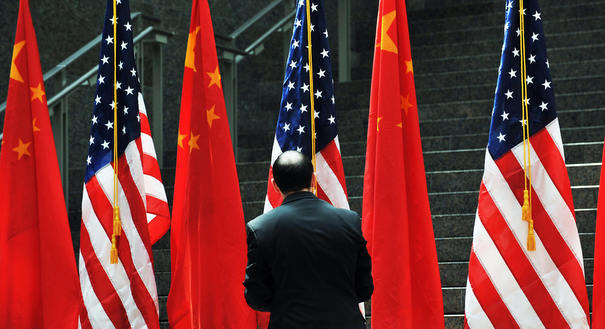{
"authors": [
"Paul Haenle"
],
"type": "event",
"centerAffiliationAll": "",
"centers": [
"Carnegie Endowment for International Peace",
"Carnegie China"
],
"collections": [
"China’s Foreign Relations",
"U.S.-China Relations"
],
"englishNewsletterAll": "",
"nonEnglishNewsletterAll": "",
"primaryCenter": "Carnegie Endowment for International Peace",
"programAffiliation": "",
"programs": [],
"projects": [],
"regions": [],
"topics": []
}
Does the U.S. Election Even Matter to China?
Tue, September 18th, 2012
Beijing
IMGXYZ3964IMGZYX2012 marks a critical period for U.S.-China bilateral relations, as both countries face potentially significant political transitions. In China, intense scrutiny has followed the CCP’s preparation for the once-a-decade change in political leadership. Meanwhile, the 2012 U.S. presidential race has brought China to the forefront of the foreign policy platforms of both President Barack Obama and Presidential nominee Mitt Romney. Carnegie-Tsinghua’s Paul Haenle addressed how U.S. and Chinese leaders will address the challenges in the bilateral relationship at a joint-event with Young China Watchers.
Presidential Campaigns vs. Post-Election Reality
Haenle pointed out that since the normalization of U.S.-China relations, presidential candidates challenging the incumbent have consistently used China as a way to distinguish themselves from the other candidate. In particular, China is mobilized by both candidates to appear tough on foreign policy issues.
- China and Key U.S. Domestic Issues: Placing the foreign policy spotlight on China allows candidates to simultaneously discuss both foreign policy issues as well as domestic issues related to the economy and trade. The latter are, as Haenle said, the “bread and butter” issues in the U.S. election, and have particular appeal for the U.S. working class population.
- Historical Trend of Presidential Flip-Flopping: However, once in office, Haenle noted that newly-elected presidents have historically moved away from their tough campaign stance on China to a more pragmatic policy approach. Former U.S. presidents Ronald Reagan and George H.W. Bush both portrayed themselves as strong Taiwan allies, criticizing the normalization of U.S.-China relations completed under President Carter. Once in office however, both forged closer relations with China. Similarly, former U.S. president Bill Clinton criticized Bush for his stance on human rights, especially on their handling of the 1989 Tiananmen Square protests. Clinton promised to tie the approval of China’s status as “most favoured nation” to its human rights record. However, after only a short time in office, he moved away from this approach.
- Why Critiques Decrease Once in Office: This change between campaign rhetoric and post-election reality results from the critical importance of a strong U.S.-China relationship, Haenle said. He added, however, that it is increasingly problematic for presidential candidates to continue using China as a tool for scoring political points during the election, a tactic which risks lasting consequences on the bilateral relationship.
Potential Outcomes of the 2012 U.S. Presidential Election
Given this trend of reneging on hard-line campaign stances on China, Haenle predicted the general framework for U.S. policy toward China would remain largely unchanged, whether President Obama is re-elected or Governor Romney is elected.
- Re-election of Obama: Haenle pointed out that Obama had pursued a friendlier policy toward China when he was first elected into office. Obama did not sell arms to Taiwan and even asked the Dalai Lama to delay his D.C. visit. However, Haenle explained that these actions resulted in China perceiving the United States as weak and in turn, adopting a more assertive policy in the first half of 2010. Since then, the Obama administration has adjusted its approach and is now being more direct with China on issues critical to U.S. interests.
- Election of Romney: Romney publicly stated that on his first day in office, he will accuse China of being a currency manipulator. However, Haenle argued that Obama had criticized China’s currency during his 2008 campaign but did not take steps to officially designate China a currency manipulator once in office. As president, Obama had to balance competing priorities within the U.S.-China relationship. As a result, Haenle explained that no president can afford the damage such an official designation would have on the bilateral relationship.
- Which Candidate Does China Prefer: Haenle explained that the Chinese have typically preferred Republican candidates ever since former president Richard Nixon, who was Republican and led the U.S.-China rapprochement. China also perceives Republicans as more pro-trade and Democrats as more pro-human rights. However, Haenle argued that because the general policy framework toward China has been relatively consistent among Republican and Democratic Presidents, these perceptions are likely changing and that Chinese may actually see fewer differences than before between the parties.
Potential Challenges for the U.S.-China Relationship:
As both countries that go through leadership transitions this fall, there are potential new challenges for the U.S.-China relationship, Haenle said. These include the hotly-debated issues of the U.S. “pivot” to Asia, territorial disputes in the South China Sea, and negative perceptions of the United States by the Chinese public.
- Fall-out from Pivot: Haenle commented that the cool response from the Chinese public to Secretary Hillary Clinton’s September visit was due in large part to the perception of Clinton as the public face of the U.S. “pivot to Asia.” Haenle said that his experience with Chinese counterparts have led him to conclude that the pivot has been perceived in some Chinese circles as largely Clinton’s doing, detached from President Obama’s policy approach.
- Territorial Disputes in the South China Sea: Since China views the territorial disputes in the South China Sea as intrinsic to its national interests, it resents any U.S. involvement in the region, Haenle said. He explained that this may continue to produce tension in U.S.-China relations, as the United States has strategic interests to protect in the region.
- Negative Chinese Perceptions: Haenle said that Chinese leaders generally understand that U.S. politicians use China as a political punching bag to score votes during election season and the rhetoric will become much more pragmatic post-election. However, the general public in China may not understand these dynamics which then risks adding to negative perceptions of the United States and deepening mistrust and tensions.
Carnegie does not take institutional positions on public policy issues; the views represented herein are those of the author(s) and do not necessarily reflect the views of Carnegie, its staff, or its trustees.
Event Speaker
Paul Haenle
Former Maurice R. Greenberg Director’s Chair, Carnegie China
Paul Haenle held the Maurice R. Greenberg Director’s Chair at the Carnegie Endowment for International Peace and is a visiting senior research fellow at the East Asian Institute, National University of Singapore. He served as the White House China director on the National Security Council staffs of former presidents George W. Bush and Barack Obama.
